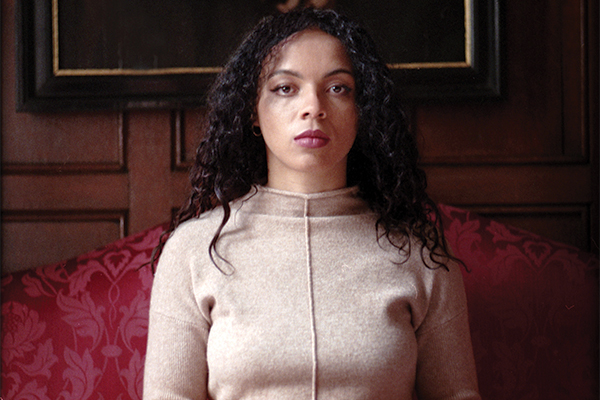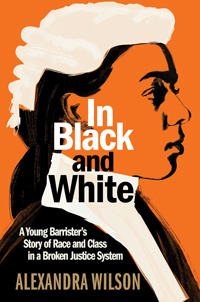*/

Tackling ‘isms’ from the inside and making global headlines – a remarkable young barrister shares her experience of defying the odds, breaking into an elite profession and challenging attitudes to race and class in the justice system
By Alexandra Wilson
I am a 26-year-old, state-school educated, mixed-race woman from Essex, and proud to say that I am a junior criminal and family law barrister. People told me that this profession wasn’t for ‘people like me’ and after tweeting early last year that I was ‘what a barrister looks like’, I was invited to write about my experiences.
My book, In Black and White: A Young Barrister’s Story of Race and Class in the Justice System is exactly that: I describe what it is like for someone like me to break into a profession that is still largely white, male and middle-class. It follows me through 12 months of pupillage as I navigate the elite profession that is the Bar, where both Black people and women continue to be underrepresented.
What first sparked my interest in criminal justice? A close family friend was murdered when we were both just 17 years old. He was assumed to be a gang member because of the colour of his skin. His life was stolen and he never had the opportunity to finish school or go to university.
Despite being discouraged from applying to Oxbridge, I persevered. I studied Philosophy, Politics and Economics at the University of Oxford and loved the intellectual stimulation. The environment was more difficult, though, and I have spoken openly about the imposter syndrome I felt both there and continued to feel when joining that Bar; the feeling that I didn’t belong. Some people have expressed surprise at the overtly racist or classist comments I received at university, but many others from similar backgrounds to me acknowledge how prevalent these ‘isms’ still are.
These experiences continue into the profession. Barristers have told me that the Black community is ‘good for business as they keep killing each other’; another barrister has imposed his views on me about ‘diversity compromising quality’ in the judiciary; a fellow barrister sighed with relief at the retirement of a ‘racist judge’.
And just a few weeks ago I was mistaken for a defendant by court officials on three separate occasions in one day. Of course, this wasn’t the first time and it had happened a number of times to both me and other Black colleagues. This time, though, my tweet made national news. My story was broadcast across the world. Many were shocked that these attitudes persist in 2020 but many of my Black colleagues, sadly, were not at all surprised. Within 24 hours of my tweets I had been contacted by most of the Black barristers and solicitors I know who told me that they had experienced something very similar. A number of Black QCs told me that this had been going on since they were pupils. Even when they sit as judges they are often challenged and directed to alternative parts of the buildings.
It was not so much about me not being recognised for being a lawyer; that misses the point. I was dressed in a smart black suit, carrying a laptop and, aside from the colour of my skin, I looked similar to every other legal representative in the magistrates’ court. That day, court officials overlooked the obvious signs that I might be a legal representative. Because of the colour of my skin they assumed that I was attending court as a defendant.
This is symptomatic of a much larger issue, and one I explore in my book; the overcriminalisation of Black people in our justice system. Statistics highlight the systemic racism in our justice system. Much of this begins with the overpolicing of Black people, who are stopped and searched at a rate of 38 per 1,000 people compared to a rate of just 4 per 1,000 white people. We continue to see racial disparity throughout the justice system, in disproportionate sentencing and an overrepresentation of Black people in prison.
In the courts, lack of trust in the ‘establishment’ can adversely affect defendants, which disproportionately affects those from minority backgrounds – especially Black defendants. For example, Black people are less likely to plead guilty than their white counterparts and hence are less likely to benefit from credit for an early guilty plea. This, of course, affects sentencing. One of the likely reasons for this unwillingness to plead guilty in circumstances where it may be in the client’s interest to do so is that there is a deep lack of trust between many Black people and what might be considered the ‘establishment’. While barristers are independent, it can be difficult for a client who is understandably anxious and nervous about their proceedings, to fully appreciate our independence and trust us, notwithstanding that in many instances they may have only just met us for the first time that day and are told they need to make a decision within a very short period of time.
A few months ago, though, I was able to tweet a really special moment; the first time I entered a courtroom where the judge was Black, the prosecutor was Black and the usher was Black. It was overwhelming, particularly because it was the first time that I had ever seen a Black, male judge. In my book, I try to show just how important it is for clients to see representative faces in the courtroom. We cannot expect clients to have faith in a system where the only people they see that look like them are the other people behind the dock.

One of the things I really wanted to achieve is to humanise my clients and show the real-life impact of some of these systemic issues. Clients are affected by homelessness, poverty, abuse, addictions and many other issues. I want to enable readers to empathise with many of the people who are drawn into the justice system as a result of their circumstances and highlight many of the huge injustices, such as being held on remand for six months (or often longer) only to be found not guilty and to be given no compensation nor an apology.
Our justice system is failing many of us when it comes to issues of race and class. There is a lot of work to be done and we must continue to headline this. By sharing my story I also want to inspire the next generation of barristers, many of whom – I hope – will say that this profession is for people like them. We should reflect the society that we represent and it’s time that the Bar catches up.


I am a 26-year-old, state-school educated, mixed-race woman from Essex, and proud to say that I am a junior criminal and family law barrister. People told me that this profession wasn’t for ‘people like me’ and after tweeting early last year that I was ‘what a barrister looks like’, I was invited to write about my experiences.
My book, In Black and White: A Young Barrister’s Story of Race and Class in the Justice System is exactly that: I describe what it is like for someone like me to break into a profession that is still largely white, male and middle-class. It follows me through 12 months of pupillage as I navigate the elite profession that is the Bar, where both Black people and women continue to be underrepresented.
What first sparked my interest in criminal justice? A close family friend was murdered when we were both just 17 years old. He was assumed to be a gang member because of the colour of his skin. His life was stolen and he never had the opportunity to finish school or go to university.
Despite being discouraged from applying to Oxbridge, I persevered. I studied Philosophy, Politics and Economics at the University of Oxford and loved the intellectual stimulation. The environment was more difficult, though, and I have spoken openly about the imposter syndrome I felt both there and continued to feel when joining that Bar; the feeling that I didn’t belong. Some people have expressed surprise at the overtly racist or classist comments I received at university, but many others from similar backgrounds to me acknowledge how prevalent these ‘isms’ still are.
These experiences continue into the profession. Barristers have told me that the Black community is ‘good for business as they keep killing each other’; another barrister has imposed his views on me about ‘diversity compromising quality’ in the judiciary; a fellow barrister sighed with relief at the retirement of a ‘racist judge’.
And just a few weeks ago I was mistaken for a defendant by court officials on three separate occasions in one day. Of course, this wasn’t the first time and it had happened a number of times to both me and other Black colleagues. This time, though, my tweet made national news. My story was broadcast across the world. Many were shocked that these attitudes persist in 2020 but many of my Black colleagues, sadly, were not at all surprised. Within 24 hours of my tweets I had been contacted by most of the Black barristers and solicitors I know who told me that they had experienced something very similar. A number of Black QCs told me that this had been going on since they were pupils. Even when they sit as judges they are often challenged and directed to alternative parts of the buildings.
It was not so much about me not being recognised for being a lawyer; that misses the point. I was dressed in a smart black suit, carrying a laptop and, aside from the colour of my skin, I looked similar to every other legal representative in the magistrates’ court. That day, court officials overlooked the obvious signs that I might be a legal representative. Because of the colour of my skin they assumed that I was attending court as a defendant.
This is symptomatic of a much larger issue, and one I explore in my book; the overcriminalisation of Black people in our justice system. Statistics highlight the systemic racism in our justice system. Much of this begins with the overpolicing of Black people, who are stopped and searched at a rate of 38 per 1,000 people compared to a rate of just 4 per 1,000 white people. We continue to see racial disparity throughout the justice system, in disproportionate sentencing and an overrepresentation of Black people in prison.
In the courts, lack of trust in the ‘establishment’ can adversely affect defendants, which disproportionately affects those from minority backgrounds – especially Black defendants. For example, Black people are less likely to plead guilty than their white counterparts and hence are less likely to benefit from credit for an early guilty plea. This, of course, affects sentencing. One of the likely reasons for this unwillingness to plead guilty in circumstances where it may be in the client’s interest to do so is that there is a deep lack of trust between many Black people and what might be considered the ‘establishment’. While barristers are independent, it can be difficult for a client who is understandably anxious and nervous about their proceedings, to fully appreciate our independence and trust us, notwithstanding that in many instances they may have only just met us for the first time that day and are told they need to make a decision within a very short period of time.
A few months ago, though, I was able to tweet a really special moment; the first time I entered a courtroom where the judge was Black, the prosecutor was Black and the usher was Black. It was overwhelming, particularly because it was the first time that I had ever seen a Black, male judge. In my book, I try to show just how important it is for clients to see representative faces in the courtroom. We cannot expect clients to have faith in a system where the only people they see that look like them are the other people behind the dock.

One of the things I really wanted to achieve is to humanise my clients and show the real-life impact of some of these systemic issues. Clients are affected by homelessness, poverty, abuse, addictions and many other issues. I want to enable readers to empathise with many of the people who are drawn into the justice system as a result of their circumstances and highlight many of the huge injustices, such as being held on remand for six months (or often longer) only to be found not guilty and to be given no compensation nor an apology.
Our justice system is failing many of us when it comes to issues of race and class. There is a lot of work to be done and we must continue to headline this. By sharing my story I also want to inspire the next generation of barristers, many of whom – I hope – will say that this profession is for people like them. We should reflect the society that we represent and it’s time that the Bar catches up.

Tackling ‘isms’ from the inside and making global headlines – a remarkable young barrister shares her experience of defying the odds, breaking into an elite profession and challenging attitudes to race and class in the justice system
By Alexandra Wilson


The Chair of the Bar sets out how the new government can restore the justice system
In the first of a new series, Louise Crush of Westgate Wealth considers the fundamental need for financial protection
Unlocking your aged debt to fund your tax in one easy step. By Philip N Bristow
Possibly, but many barristers are glad he did…
Mental health charity Mind BWW has received a £500 donation from drug, alcohol and DNA testing laboratory, AlphaBiolabs as part of its Giving Back campaign
The Institute of Neurotechnology & Law is thrilled to announce its inaugural essay competition
How to navigate open source evidence in an era of deepfakes. By Professor Yvonne McDermott Rees and Professor Alexa Koenig
Brie Stevens-Hoare KC and Lyndsey de Mestre KC take a look at the difficulties women encounter during the menopause, and offer some practical tips for individuals and chambers to make things easier
Sir Geoffrey Vos, Master of the Rolls and Head of Civil Justice since January 2021, is well known for his passion for access to justice and all things digital. Perhaps less widely known is the driven personality and wanderlust that lies behind this, as Anthony Inglese CB discovers
The Chair of the Bar sets out how the new government can restore the justice system
No-one should have to live in sub-standard accommodation, says Antony Hodari Solicitors. We are tackling the problem of bad housing with a two-pronged approach and act on behalf of tenants in both the civil and criminal courts